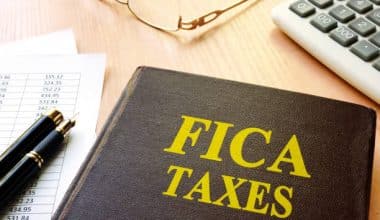DC is one of the cities with high rates of income tax returns. Every income earner in DC must file a tax return at the expected rate every year, depending on how much they earn. You can decide to file your tax return as an individual or a couple, but there’s no such thing as tax evasion, or else you’ll face a government fine. Well, irrespective of the high income tax rates, salary earners in DC earn considerably higher amounts than people in other cities, so the high cost of living and high income tax rates on return are quite understandable. If you’re considering moving to or staying in Washington, DC, area,you need to consider your salary, the tax rates, as well as the cost of living.
DC Income Tax Rates
Like every other state in the United States, DC has its own IRS rates for income tax. For residents of Washington, D.C., there are about 5 different tax rates for personal earnings. These five range from 4% to 8.95%.
#1. Personal Income Tax
If you reside in Washington DC, your income tax must fall within any of the following categories.
- 4% on the first $10,000 of taxable income.
- 6% on taxable income between $10,001 and $40,000.
- 7% on taxable income between $40,001 and $60,000
- 8.5% on taxable income between $60,001 and $350,000.
- 8.95% on taxable income of $350,001 and above.
Up to $3,000 in total, Social Security income, military retired pay, pensions, and annuities from the federal or D.C. governments are all exempt. People who reside in Columbia usually file their tax returns by April 15, but if that date falls on a weekend or holiday, it is the next business day. To qualify for a tax credit, homeowners and renters with taxable income of up to $20,000 must submit Schedule H, which is a component of the D-40 paperwork.
#2. Sales Tax
The general consumer sales tax in the District of Columbia is 5.75%. On the other hand, Washington, D.C. levies a sales tax with five separate rates. This tariff system is employed in part to take advantage of the district’s special status as a popular tourist destination and to increase the contribution of nonresidents who work in the city. The following are the current sales tax rates:
- 5.75 percent for tangible personal property
- 10% of alcohol sold for off-site consumption
- 10% off for takeout, vehicle rentals, calling cards, and meals at restaurants.
- Parking fees at companies are 18%.
- 14.5% for hotel and motel stays.
The District of Columbia does not impose a sales tax on domestic utility services, prescription, and over-the-counter pharmaceuticals, or groceries.
#3. Personal Taxes and Real Estate
Property owners who rent their property usually file for taxes too. However, the office of tax and revenue’s real property tax administration, and assessment division are the ones who assess properties.
There are four categories of real estate in the District of Columbia.
- Class 1 real estate includes multifamily residential properties.
- Class 2 real estate includes hotels and motels as well as commercial and industrial buildings.
- Class 3 real estate is that which is vacant.
- Class 4 real estate is in disrepair.
Property tax bills are mailed twice a year. In February, your statement is split in two and mailed to you. On March 31, the tax payment is due. You’ll receive the second statement via mail in August and your tax payment is due on September 15th. Failure to make prompt payment generally comes with a fine.
The District of Columbia provides several tax relief programs to assist property owners. Common ways to lower property taxes include homestead exemptions, historic property tax credits, senior citizen tax relief, and property tax exemptions and deferrals.
With 28.5% of all local-source general fund receipts for the District of Columbia in the 2015 fiscal year, the real property tax is the main source of tax revenue.
#4. Taxes on Estates and Inheritances
The District of Columbia no longer levies an inheritance tax. Despite this, the district imposes its estate tax because it is not subject to federal estate tax laws. Form D-76 or D-76 EZ, the D.C. You’ll have to submit an estate tax return if the gross estate is $1 million or higher.
What’s considered discretionary income?
Your annual income less 100% of the poverty threshold for your family size and state of residence, as it relates to the Income-Contingent Repayment Plan, is referred to as discretionary income. The U.S. Department of Health and Human Services is responsible for maintaining the poverty guidelines.
How do I calculate discretionary income?
Your discretionary income is determined by subtracting your annual income from 100% of the federal poverty level for your family size and state. The lower of 20% of your discretionary income per month or fixed payments based on a 12-year loan term applies to your monthly installments.
Does discretionary income include spouse income?
Discretionary income is defined as a household’s income that is over the federal poverty level by 150%, taking into account the borrower’s family size and state of residency. No of how the borrower and his or her spouse file their taxes, for the purposes of this plan, the borrower’s household income is equal to the sum of their individual AGIs
What are the 4 levels of income?
The World Bank divides economies into four income groups for analytical purposes: low, lower-middle, upper-middle, and high income.
DC Income Tax vs Virginia
When it comes to DC vs Virginia income tax, there are certain things to take into consideration, and first on the list is that state laws and tax rates differ from one another. However, so long as you’re a resident within a state for a fiscal year, you’ll have to pay tax. You can also decide to relocate to a state like Virginia if you feel the tax burden of DC is too high. The best state to relocate to is typically determined by personal considerations like commute times and lifestyle choices. Still, in line with DC vs Virginia tax income, DC income can be as high as 8.95% whereas Virginia is just about 5.7%. Each of the three states will tax your income differently in each of the ways listed below.
Income Tax Rates
Of the three states, Washington, DC has the highest income tax rate. As of 2019, there are six income tax brackets, with rates ranging from 4% to 8.95%.
- 4% of your first $10,000 in taxable income
- with 6% taxable income between $10,001 and $40,00
- 6.5% of taxable income between $40,001-$60,000 range
- The rate is 8.5% for taxable income of $60,001 to $350,000.
- 8.75% of taxable income between $350,001 and $1,000,000
- The tax rate is 8.95% on taxable income of $1,000,000 or more.
There are four income tax brackets in Virginia for 2019 with rates ranging from 2% to 5.75%:
- the first $3,000 of taxable income is subject to a 2% tax rate.
- 3% of taxable income between $3,001 and $5,000.
- 5% of taxable income between $5,001 and $17,000
- Over $17,001 in taxable income results in a levy of 5.75%.
For taxpayers making more than $250,000 a year, Virginia would tax you at the same rate, which is still around 3% less than what you would pay as a resident of DC.
Specific Income Tax Items
For 2019, Washington, DC residents who have taxable incomes of $50,500 or less ($61,900 or less if they are 70 years of age or older) are qualified for a tax credit of up to $1,025 based on their rent or property taxes, except for public housing and property owned by nonprofit organizations or places of worship. State income taxes do not apply to Social Security benefits, and the first $3,000 of military, federal, and DC pension income is tax-free. This is good news for retirees considering moving to DC.
Virginia has a simpler income tax structure than other states and offers fewer additional tax breaks. Although Maryland has more complicated municipal income taxes, it also provides a wide range of credits and deductions. There is an additional nonresident tax of 1.75 percent on top of your standard state income tax if you operate a business or possess rental property in Maryland. However, you are excused from filing a nonresident tax return and paying this tax if your primary source of income in Maryland is wages and you reside in Virginia, DC, West Virginia, or Pennsylvania.
Sales Tax
The general sales tax rate in Washington, DC, is 6.00%. For meals consumed in or carried out of restaurants, rental cars, calling cards, and alcohol, there is a supplementary 10% tax in addition to hotel and business parking fees. The majority of goods are taxed at the regular rate, except foodstuffs, prescription and over-the-counter pharmaceuticals, and residential utilities.
Virginia levies a 4.3% general sales and uses tax in addition to a 1% municipal sales tax. The average sales tax in Virginia is 5.3%, however, some localities in Northern Virginia and Hampton Roads impose an additional 6% due to the additional 0.7% tax there. Sales tax is charged on some food items, although only at a base rate of 1.5%, which becomes 2.5% when local taxes are added in. Use taxes are charged on out-of-state purchases over $100 during the whole year.
Estate Tax
If you reside in Washington, DC, you’ll have to file a tax return if the gross estate has a gross value of $,1000,000. Whereas, Virginia has no longer collected estate tax since 2007.
DC Income Tax Return
OTR’s improved security measures to safeguard tax dollars and combat identity theft/tax refund fraud may result in longer processing times for some tax returns and accompanying refunds. The processing period for some tax returns could extend up to six weeks.
Do I need to file a DC income tax return?
Oftentimes, people want to know if they are free not to file a tax return. Like I’ll always say, it’s almost impossible to evade tax payments in the United States. However, check out the following to know if you’re eligible for a tax return or not.
- Given that you resided in the District of Columbia, you were required to file a federal tax return. (Residents are generally people who reside in the state for that fiscal tax year,
- Even if your permanent abode was elsewhere, you inhabited a space there for a minimum of 183 days;
- You spent a portion of the year residing in Washington, DC
- You were a member of the United States (U.S.) armed forces and your official residence during the entire or a portion of the tax year was the District of Columbia;
- You are the spouse of an elected official, an armed forces personnel, a non-resident presidential appointee, or any other exempt person;
- If any of the following refundable credits are available to you and you want them:
- Earned income tax credit in DC
- Earned Income Tax Credit for Non-Custodial Parents, Schedule N;
- Schedule H of the Homeowner and Renter Property Tax Credit; or
- Affordable Child Care Tax Credit Schedule ELC (formerly Early Learning Tax Credit).
How can I submit a request for a personal income tax return filing extension?
I think the first question ought to be, can I file for a file extension in DC? Luckily, you can, it’s possible to file a tax extension in DC. Taxpayers can still request a filing extension for their income, partnership, and franchise tax filings. But then, the rule is subject to changes, so you must check with the current policy for guidelines on how to go about this.
Generally, the Office of Tax and Revenue will extend six months for US Armed Forces personnel stationed in certain combat zones to file their District income tax returns and make any necessary payments. During this time, assessment and collection dates are prolonged, but no penalties or interest will be imposed. Couples who file either separate or joint returns are also eligible for the extension.
How Much is DC Tax on Income?
The District of Columbia (DC) has a progressive individual income tax system with rates ranging from 4.00% to 10.75%.
Do I have to pay DC income tax?
If you are a resident of the District of Columbia and you have to file a federal tax return, you must also file a DC tax return.
Why is DC Income Tax So High?
This is partially a result of the high average income of Washington, D.C., which increases the tax burden brought on by the federal tax system’s progressive character.
Who is Subject to DC income tax?
Even if your permanent abode was elsewhere, you spent at least 183 days in the District of Columbia during the tax year. Your official residence for the entirety or a portion of the taxable year was the District of Columbia, and you were a member of the armed services.
Is DC Income Tax Higher than MD?
For the majority of middle-class taxpayers in the three states, Maryland has the lowest state income tax rates, which are around half what you’d pay if you lived in Washington, DC.
What is a Good Salary in DC?
Any salary over $72,000 is considered a good salary in Washington, DC. Because the median income in Washington is $72,000, if you make more than that, you are making more money than half of the residents of Washington.
Conclusion
While it’s true that the DC income tax return rate is extremely high, the truth is that DC is one of the highest-paying cities in the United States, so it’s more like a fair deal. But if you have an issue with this, you can always relocate to states with lower tax rates.
DC Income Tax FAQs
Who is subject to DC income tax?
Everyone that stayed in the city for up to183 days or more.
DC vs Virgina, which state has the the higher tax rate?
DC has a higher tax rate than Virginia. Dc income tax rate is 8.5% while that of Virginia’s is %7%.
- TAXABLE INCOME: Definition, Examples & Calculations
- INCOME TAX: Overview, e Filing, and Calculator(Opens in a new browser tab)
- What Affects Credit Score: Top 5 Factors That Can Help Your Credit
- Industrial Insurance: Definition and Detailed Explanation






